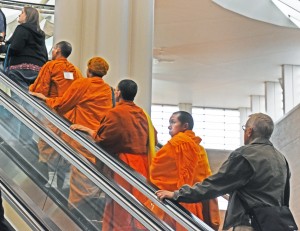From time to time, the curators over at the Patheos Public Square send out writing prompts to all of us. Usually, they don’t fit well within the overall topic of interfaith that we tend to stick to here at the Wild Garden so I, personally, haven’t used them. This time, though, I think there is a connection to be made.
For the public square, we were asked to answer a question: has capitalism failed?
Unfortunately, I don’t think the world deals in absolutes, so the answer can only be “yes and no.” Clearly, capitalism hasn’t seemed to fail large corporate interests; Exxon Mobil announced earnings of 32.6 billion dollars in 2013. And, that was a bad year; they made 44.8 billion in 2012.
I propose a better question: if it’s working for some, for whom has capitalism failed?
Before I continue, I’d like to make it clear that I’m not an economist. As a result, I probably do not have a full understanding of what capitalism is and how to make it work for me. Thus, perhaps the answer to my question is fairly simple: capitalism fails for those who do not understand it.
Capitalism in a Nutshell
My basic understanding of capitalism is simply that it’s an economic system in which private individuals can own businesses to produce the goods and/or services that the rest of us consume. The relationship works when the producers pay consumers a wage high enough that they can consume at a rate that continues to fund the production of further goods/services, and in a perfect world, this relationship between production and consumption exists in balance.
If we assume that this balance is a necessary part of capitalism, then perhaps it is in the process of failing for more than just those who do not understand it; maybe the imbalance that appears to be growing within that relationship signals a larger weakness even for the well-informed capitalists in our midst.
Evidence of that imbalance can be found without looking too hard. The Pew Research Center tells us that U.S. income inequality–the difference between what the rich make and what the rest of us earn–is at its greatest since 1928. In fact, since the financial crisis in 2007, the richest of the rich have actually not only recuperated their losses, they’ve actually exceeded their prior net worth.
But this sort of imbalance isn’t only to be found within incomes. The World Bank has a focus on food production and waste. In a report from February 2014, they found that the amount of food that we’re wasting is between one-third and one-fourth of all food produced. The amount of waste is greater in developed economies (e.g. the U.S.) and lower elsewhere, but we’re all wasting food. The balance between production and consumption, in this case, is all out of whack. Not only are some of us not being paid enough to consume, but what we do purchase, we’re wasting.
Worse: that waste could greatly benefit others elsewhere in the world, but despite all the vast wealth that some have, we can’t seem to figure out how to get that wasted food to where it needs to be.
Again, I’m sure there are vast uncountable variables inherit within these systems that I do not have the knowledge to understand. But, when the U.S. and Oceania can waist around 1,500 calories per person per day, I don’t think I need to be an economist to understand that both we need to begin to recognize imbalances such as these are dangerous and we need to rectify them.
How Interfaith Helps
As a religious person, I suppose it isn’t a shock that I find guidelines that might help to do so within religion. I struggle, at moments like these, to find inclusive language with respect to atheist communities who have answered the call to try and help in matters such as these, but please understand that communities of the faithful and the faithless have begun to call for change.
The skills that interfaith activists learn to use (dialog, compromise, active listening, empathy, etc.) are the very same skills that need to be brought to bear with respect to the capitalist forces that pull us apart. The respect for individuals as individuals–whether they be atheists, Jews, Christians, Pagans, Muslims, or whatever–and the willingness to work together is going to become increasingly necessary as we’re thrust more closely together.
This is especially true if we don’t correct capitalist imbalances so that it begins to work for more of us once more. In such a world, we may no longer be able to rely on family-based incomes to survive. Instead, we may have to work together as neighbors and neighborhoods to produce our own goods and share them together. In the U.S., this will inevitably bring us together those whose philosophies and goals for such a cooperative effort are in conflict, and it is going to be the peacemakers among us–like interfaith activists–who will be called upon to try and work out the kinks.















